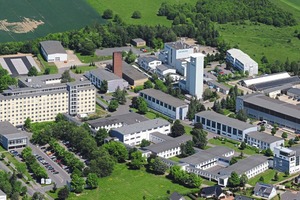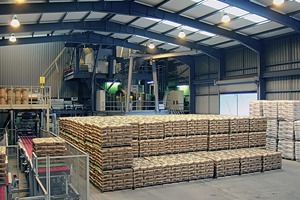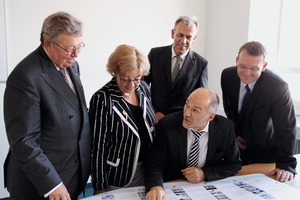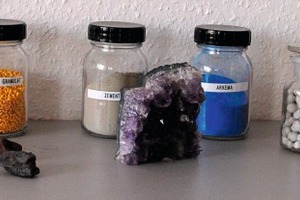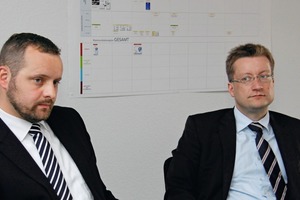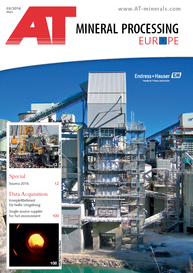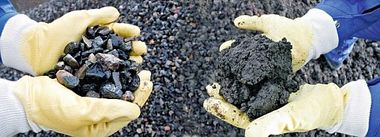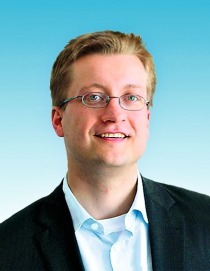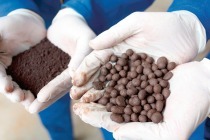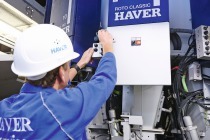Expansion of activities accompanies relocation – the new HEM
After eight years, Haver Engineering (HEM) has relocated from Meissen, the city of its birth, to the university city of Freiberg, and has, in parallel, also expanded its business activities”, announces Dr. Stephan Hüwel, CEO at HEM.
The move from Meissen to the Halsbrücker Strasse in Freiberg took place 2015 as a result of the close cooperation between the TU Bergakademie Freiberg University of Resources and HEM. “It is pleasing for us that we are now in an environment where we are geographically close to the university and can, in addition, easily make and maintain contacts with other local companies in our industry. It’s also beneficial for our customers, because they no longer need to travel between Meissen and Freiberg”, Dr. Hüwel notes.
The link with the TU was extremely close from the very start, since HEM’s focus is on the development of processes and technologies for the preparation of mineral resources. HEM has been an accredited affiliated institute of the TU Bergakademie Freiberg since 2009, imparting special intensity to the cooperation between them. Industrially orientated topics important for HEM in the field of preparation technology are, for example, investigated in the context of degree, bachelor’s and master’s theses and dissertations. HEM conducts Research & Development projects in joint technology-center facilities, while its experts play a role in university teaching and in the practically orientated training of students.
HEM is a subsidiary of HAVER & BOECKER OHG, domiciled a good 500 km away, in Oelde, Westphalia. This family-managed medium-sized enterprise celebrated its 125th anniversary in 2012, and employs some 2900 persons around the globe. Overall, HAVER & BOECKER comprises a total of 50 subsidiaries and more than 150 agencies. Haver Engineering is one of these subsidiaries. The AT MINERAL PROCESSING editorial team took the company’s relocation as an opportunity to learn more about HEM and its business activities and to meet three HEM employees: Dr. Stephan Hüwel, Dr.-Ing. Hagen Müller and Dipl.-Ing. Jan P. Lampke.
AT: What fields has HEM covered up to now?
Dr. Stephan Hüwel: HEM is a specialist in research projects at an extremely early stage on the value chain. For this reason, we enter new territory for many of our assignments - mainly in the field of pelletising and washing. We have now accumulated many years of experience in these sectors, and have developed a large range of solutions for our customers. Process design is often the starting point of a project. When new feed materials or new processes are involved, there are many questions to be answered, tests to be performed, and feasibility to be demonstrated, particularly right at the start. Here, our customers benefit from the far-reaching experience possessed by HEM experts with very diverse materials from a range of different industries. We provide our customers, for example, with process design, and with data on material flows, the machinery to be used and on the products generated.
We now operate, jointly with the TU, an extremely well equipped technology center with facilities for a broad bandwidth of tests, both in terms of equipment and analysis. Our status as an affiliated institute helps us enormously when supra-disciplinary cooperation within the university is necessary to find the solution.
But that’s not enough for us: we aim to - and we will - achieve even more!
AT: How many employees do you have to cover this diverse range of tasks?
Dr. Stephan Hüwel: There are six of us. That doesn’t sound like many, but you have to view this relatively, because we can count on support from the university. In research, in particular, the TU is an extremely dependable partner, and possesses great know-how and a large range of testing and analytical facilities. Working as an affiliated institute assures a scientific approach to tasks, but always with an absolutely unequivocal focus on corporate applications. That’s the difference compared to academic basic research, which aims purely at acquiring new knowledge.
AT: What does HEM’s reorientation signify?
Dr. Stephan Hüwel: I’d prefer not to speak about “reorientation”, but rather about an expansion of our business activities. We are adding two further fields to our previous Research & Development activities: the passing-on of the knowledge acquired via seminars and training courses is the core task of our Initial and Further Training division. Dipl.-Ing. Jan P. Lampke is responsible there. The third division is Plant Operation. In cases in which we develop and also design new processes, we can also offer customers the service of operation of the new plant for a specified period - we have not only the equipment, but also the knowledge needed to achieve optimum operation. Dr.-Ing. Hagen Müller is responsible here.
AT: So what does your task involve?
Dipl.-Ing. Jan P. Lampke: It is my conviction that motivation, the never-ending acquisition of technical knowledge, and life-long learning for employees are the crucial factors in the success of a company. This is why I intend to consistently expand this new division.
AT: Is this initial and further training only for HAVER & BOECKER employees?
Dipl.-Ing. Jan P. Lampke: No, but there is, nonetheless, a series of seminars aimed at further training for internal sales and project engineers who have not been trained in preparation technology. Here, we impart the general fundamentals of preparation and know-how for special processes.
The focus of our seminars is on the initial and further training of external participants, however. We have already completed a number of seminars and training courses for customers, and the extremely good feedback we received encouraged us to expand and intensify these activities. We offer initial and further training of employees, engineers and preparation technologists for our customers and for other companies in this industry.
AT: How do you organise the external seminars, in particular? Are they also available internationally?
Dipl.-Ing. Jan P. Lampke: These seminars and further-training provisions are available not only in Freiberg, but also around the world, at well established institutions and, of course, at customers’ facilities. We sometimes augment our own instructors with local experts. The seminars are held at selected research institutions known to us, such as universities, research institutions and other training centers, for example, with which we already maintain business relations. Seminars held directly at the customers’ premises are another possibility, if teams are to be trained on specific topics. Or, for example, when departments from various corporate sectors are merged. We train the customer’s specialist departments in provisions specifically tailored to his needs, and bring their knowledge and abilities up to the latest state-of-the-art. The entire bandwidth of these initial and further-training provisions has been a fixed component of our range of services since early 2014.
AT: And what has been the response in practice to this new business activity?
Dr. Stephan Hüwel: As Herr Lampke just mentioned, we have already completed such initial and further-training provisions, both for our own employees and also externally, for customers. In both cases, we can look back even now on experience, without having set up a separate division for this. The fact that we are now taking this step is a clear affirmation of our intention to expand this activity! We believe that continuous occupational learning will become – and, in fact, already is – a fixed element in the content profile of modern jobs. This is where we come in, with our experience and our know-how.
AT: In addition to Research & Development?
Dr. Stephan Hüwel: Exactly! Our Research & Development sector has always been - and it will continue to be - the source of our knowledge and our experience, which we are now passing on in the form of initial and further-training provisions.
But there is also a third field which is evolving into a new division: I mean here “build-operate-transfer”, or “BOT”, models. Our parent company, HAVER & BOECKER, has maintained good relations with customers for decades, and enjoys their confidence. Many customers thus include us in their thinking for the future. We thus know that the industry’s need for build-operate-transfer models is increasing, and is also viewed as one factor in good customer/supplier relations. This is, again, the point where HEM comes in. We are establishing appropriate BOT models for all divisions of HAVER & BOECKER. This is Dr.-Ing. Hagen Müller’s task, since he has been studying this subject for some good time now, and has already evolved BOT models for a plant for the cleaning of mineral materials.
AT: What exactly is meant by the term BOT model?
Dr.-Ing. Hagen Müller: There is no precise definition of “build-operate-transfer models”. They are just as diverse and varied as, for example, business models. There are, nonetheless, certain ingredients which recur again and again. A BOT model has various phases: process design, plant configuration, plant construction and plant installation, commissioning, operation and, not least of all, the question of transfer of ownership, are ever-recurring elements. They are not always all equally prominent, however – it depends on whether a new process or procedure is to be used, and on whether we are working in established industries. But to get back to your main question: for us, a BOT model means the construction and operation of a plant plus transfer of the plant and knowledge to the customer. And now it also becomes clear why HEM is positioned absolutely perfectly to deal with the subject of BOT models. Via Research & Development, the company establishes new processes and designs plants. So it has the best preconditions for at least joint operation of such plants: Knowledge! HEM’s three divisions are therefore an ideal combination.
AT: So one possibility would be that the customer buys the machine and then says “I don’t want to operate it myself, can your staff do that for me?”
Dr.-Ing. Hagen Müller: Yes, that’s one possibility. In most cases, there will be a complete plant or system that permits a process or a process operation. In many cases, this process is new to our customers. It may then even be the most rational solution for the experts – HEM, in this case – to take responsibility for operation of the plant for a certain time. The customer is entitled to expect, during this time, that the plant runs well, that its performance is optimally adjusted, its availability is high, and also that his own staff be trained by the experts. The customer then bears a significantly lower risk, and can begin operating the plant himself, even without external support, after a predefined period of time.
AT: Does that mean that a H&B employee is on site all the time?
Dr.-Ing. Hagen Müller: Yes, our staff are on site at all times. Whether this will be an employee of HAVER & BOECKER or of a separate operating company depends on the specific project. These BOT models must be individually tailored, because the customers’ requirements are extremely diverse and because, in addition, the industries in which we work are also extremely diverse and have diverse business models. But the plant will be operated in every case by specialist staff instructed and trained precisely for the particular process.
AT: And HEM has now got itself really “fit” for this?
Dr. Stephan Hüwel: Yes, of course. We make sure that we accumulate all the necessary knowledge for all aspects of a BOT model. We have even now developed and calculated a couple of such models, so many of the preconditions are already met, and we can submit specific offers to interested customers.
AT: Do you have examples of the implementation of a BOT model by HEM?
Dr. Stephan Hüwel: We haven’t implemented any BOT models up to now, but there are already customers, there are already projects, and there are already examples from various industries. The models have been fully calculated, and we are currently agreeing them with the customers. I anticipate implementation during the first quarter of 2016.
AT: This means that there is demand, it doesn’t first have to be generated?
Dr. Stephan Hüwel: The interest is there. The “BOT model” product is not yet so well known, however, and is therefore not yet widely used in our industries. The important thing now is to get started and to publicise this new variant in business relations.
AT: Will the number of employees also increase when HEM takes on additional tasks?
Dr. Stephan Hüwel: HEM initially intends to tackle the new tasks using established personnel: we are anticipating growth in our business activities during the next two years, and HEM will adapt to the tasks and the requirements as its success grows.
AT: And these BOT model potentials will then be available globally and for all sectors covered by H&B?
Dr. Stephan Hüwel: Yes, and for all markets and industries in which HAVER & BOECKER is active and has well founded experience.
AT: So what are the benefits of a BOT model?
Dr. Stephan Hüwel: Build-operate-transfer models offer advantages for both sides, the customer and the supplier. A BOT model tailored specifically to the customer can reduce for him the financial hurdles and risks of an investment. He will also be able to operate a process with maximum efficiency and reduce downtimes to a minimum, enhancing the plant’s productivity. With a BOT model, the customer transfers operating risks, since he pays only for the tonnage processed. Another important point is the fact that BOT models facilitate – or even make possible at all – customers’ access to complex technologies, since they can then avoid the problem of having to have well trained staff available from the very start. So the customer can then leave himself more time for everything, and start operating the plant on his own responsibility only at a later time, when the process is running optimally, experience is available, and his own staff have been trained. The supplier also has a large number of benefits. Build-operate-transfer models enable him to launch new, complex technologies more successfully, to reduce the investment hurdles for customers significantly, and to expand into new markets. In addition, a supplier offering such models can better meet customers’ rising requirements. Also, not least important, is the expectation of being able to differentiate oneself positively from the competition, and generating greater sales via the expansion of new fields of business.
AT: So it would also be conceivable, if I want to enter a new field of business, to achieve that for 3 to 5 years in the form of a BOT model and then, if everything is running well, to say: OK, now I’ll buy the plant?
Dr. Stephan Hüwel: There are two aspects to this question: temporary operation of a plant, and purchase of a plant. Both items are settled before the contract is signed. Experience demonstrates that transfer of the plant to the customer’s ownership is a fixed element in the BOT model from the start. Precisely when this transfer takes place – whether the customers buys or leases the plant immediately, or takes it over at a previously agreed price at the end of the “operator phase” – is all a question of the wording of the contract. The “operator phase” should be for a fixed time. Another aim is that of instructing the customer’s staff and training them for the process. The operator always withdraws after a certain time. As is apparent, several variants are possible, and they are individually tailored to the customer’s needs, and agreed with him. We can be flexible on this item, since we can act with our parent company backing us up.
AT: What specialist knowledge do you need to draw up such BOT models?
Dr.-Ing. Hagen Müller: We first have to compile the knowledge already available throughout the group, in the various sectors. On the one hand, knowledge of the materials is necessary for BOT models, in order to be able to design the plant, and, on the other hand, knowledge of business administration and economics, because the model must be calculated for a long period, and regional legal circumstances taken into account.
AT: So that means that you only operate processes for which you can expect that operation will actually succeed for you?
Dr.-Ing. Hagen Müller: That’s our approach. The risk analysis is the basis for decision on further action and consideration. We at HAVER & BOECKER can look back on 128 years of experience. We have a broad spectrum of machines in our range, and abundant experience in the optimum design of processes for various industries and sectors. We’re good in the industries we know, and we can offer dependable BOT models for them. We have to look very carefully at anything outside our core field.
AT: Could you assess the potential of the individual sectors for us?
Dr. Stephan Hüwel: The “Build-operate-transfer models” sector is the largest by sales volume. I must emphasise that all three sectors are important to us, however, because they are interlinked with each other. Knowledge is our basis, on which the “Initial and Further Training” and “Build-operate-transfer models” sectors are founded.
AT: When is this process of restructuring in Freiberg to be completed?
Dr. Stephan Hüwel: We have set ourselves a time horizon of three years, i.e. up to the end of 2017, for the setting-up of these three divisions. We have drafted a business plan complete with targets and courses of action, and we managed to complete the preparations for implementation during the first months of this year.

